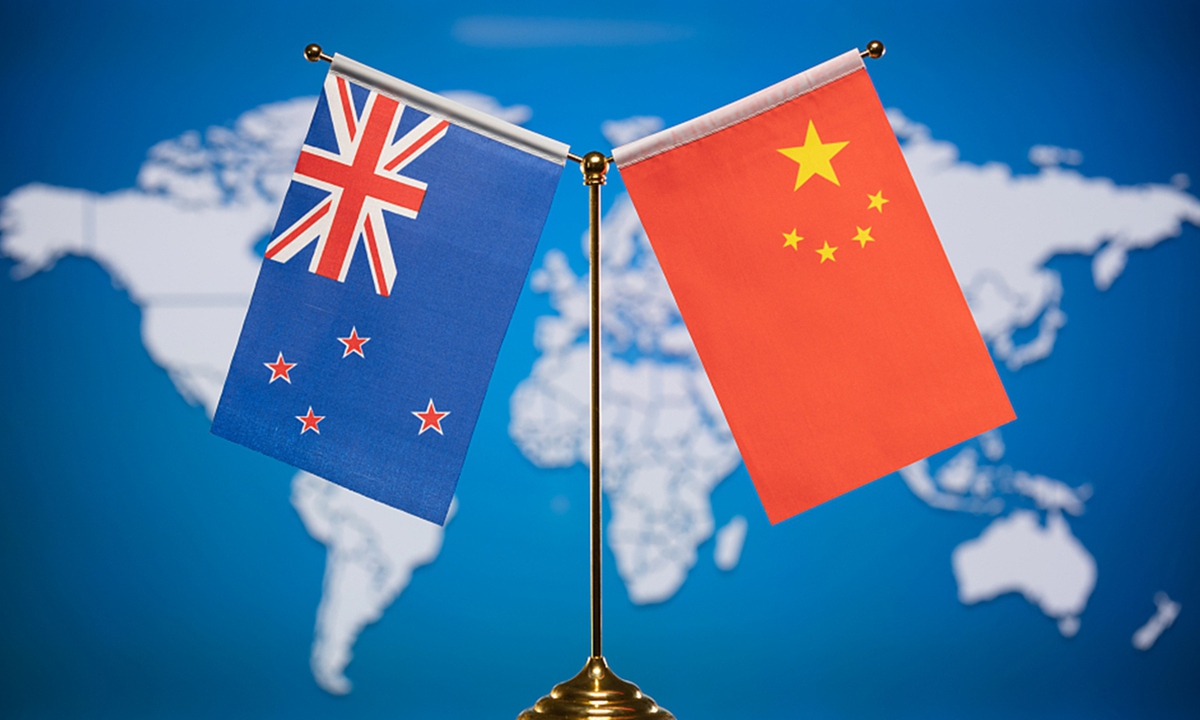
Photo: VCG
China and New Zealand signed a deal to upgrade their existing free trade pact on Tuesday.
While relations between China and New Zealand have recently been hot, China-Australia ties have come to a low ebb in the past year, with political mutual trust repeatedly undermined by the anti-China moves of the government headed by Australian Prime Minister Scott Morrison.
Economic and trade cooperation is at a low point due to Canberra's continuous discriminatory measures against Chinese companies. Today, Australia is anxiously awaiting a renewed dialogue with China, with Morrison even having consulted his predecessors for advice on how to handle relations with China.
Australia and New Zealand are very much alike in many ways. As the first and second largest economies in Oceania, both countries are members of the Commonwealth of Nations, have a large number of immigrants, and share deep ties and similarities in history and culture. Foreign trade is vital to their economic development. Both are members of the intelligence-sharing Five Eyes alliance. But what has caused such a huge difference between Australia and New Zealand in their development of relations with China in recent years?
First, New Zealand respects rules of the market economy more than Australia does. It has reached a consensus with China in promoting free trade and being more open with one another. By contrast, citing "national security" reasons, Australia has set limits on Chinese companies and legalized these discriminatory moves. Australia's Security of Critical Infrastructure Act 2018 has led to a sharp decline of Chinese investment in Australia.
Second, Wellington doesn't take sides between Beijing and Washington. As former US president Donald Trump pressured allies to take sides in the US' intensified strategic competition with China, Australia acted as an anti-China vanguard for the US.
However, New Zealand has maintained its own judgment in major China-related agendas, laying a solid foundation for sound relations with China. Some Chinese netizens joked that as members of the Five Eyes alliance, New Zealand eyes at overall interests while the Australian eye is totally blind.
Third, New Zealand is relatively open toward the rise of China. It is among some developed countries that welcome China's participation in international affairs and its proactive role in global governance. It was the first Western country to have signed a cooperative document with China under the framework of the China-proposed Belt and Road Initiative (BRI).
Australia, on the other hand, has shown no hesitation to use legislative means to abolish the BRI cooperation agreement signed between China and its state of Victoria. Australia is filled with hostility toward China's rise.
Since 2017, there have been growing waves of anti-China movements in Australian society. Australian media reports are filled with malicious sentiments about China. The Australian government, with a re-energized Cold War mentality, hyped the so-called China infiltration theory and approved foreign interference laws in 2018, which added to diplomatic tensions with China. In 2020, Australia revoked the visas of two visiting Chinese academics and searched homes of Chinese journalists stationed in the country.
All these anti-China actions not only exposed the Cold War mentality of some Australian media outlets and politicians, but also constituted a great irony to Australia's self-claimed multiculturalism.
As early as in 2017, China and Australia initiated preparations for the update of the China-Australia Free Trade Agreement. However, because Canberra started to set anti-China agendas internationally and indulged the growth of domestic hostility against China, the political trust between the two countries has hit rock bottom, blocking trade and economic cooperation.
The essential reason is that Australian leaders have made wrong judgments about general trends transpiring in the world today. They have introduced unfounded conjecture about China's relations with the Western world by employing a jingoistic Cold War mentality.
New Zealand has set an example for Australia in how to deal with China. We must ask: Will China-Australia relations continue to be in a frozen state? If Australian leaders cannot make correct judgments about China's strategy and consider China-Australia relations from the perspective of mutual benefits and win-win results, it will be of no help regardless of how many China experts they consult with.
The author is executive research fellow at Center for Australia, New Zealand and South Pacific Studies, Chinese Academy of Social Sciences. opinion@globaltimes.com.cn




